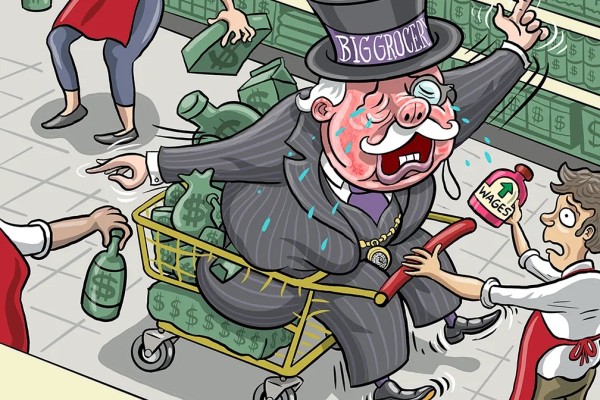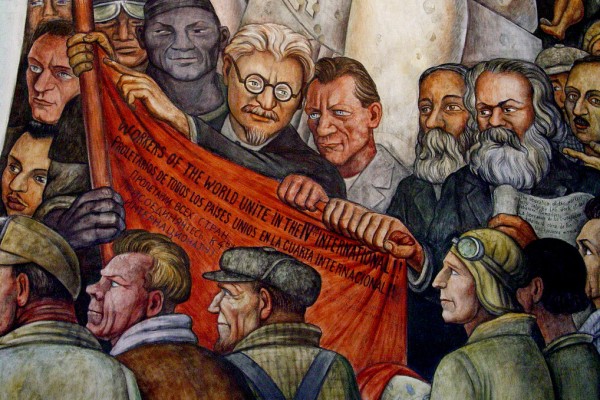-

Canada’s corporate subsidies mostly enrich shareholders of multinationals
The empty economic calories provided by business subsidies have a long history in Canada, but their magnitude has increased dramatically in the past decade of Liberal rule. While the Harper government doled out $14 billion in subsidies to business during its last year in office, such subsidies more than doubled during the ensuing nine years of Liberal rule to $33 billion by 2023-20.
-

Demolishing Pierre Poilievre’s radical blueprint for Canada
The first book from The Breach’s new publishing arm Breach Books, The Poilievre Project: A Radical Blueprint for Corporate Rule, is a short but incisive analysis of Pierre Poilievre’s ideology. Martin Lukacs’ deep and methodical analysis yields a nuanced portrait of Poilievre as a more radical far-right break from the history of Canadian neoliberalism.
-

Canada and Ukraine: the careful suppression of a shameful history
Peter McFarlane’s Family Ties is a remarkable book on a period of history—the Second World War, before and after—that continues to haunt us. It is also a powerful antidote to Canadian amnesia and especially to the attempts to rewrite the history of that war to justify the warmongering provocations of Washington, Ottawa, London, Paris and other NATO countries.
-

Taking housing policy solutions to their failure point
For urban planner and professor Carolyn Whitzman, the tactics that allow tenants to challenge rent increases, resist evictions, and improve their living conditions have only a marginal place in the equation for social change. In the world of Home Truths, her new book, those who have been adversely impacted by the housing crisis are given no opportunity to fight back.
-

Breaking the corporate stranglehold over Canadian consumer life
From gasoline to housing to groceries to concert tickets to fertilizer, the average Canadian can no longer afford a comfortable life, and everyone knows it. Denise Hearn and Vass Bednar expose the details of the current crisis in a new book, The Big Fix, and propose solutions to bring the country back to a more inclusive economy that allows for better competition and fairer pricing.
-

Western Marxism and the world crisis
Marxism is in the throes of a great intellectual renewal worldwide reinforced by the ongoing capitalist crisis and the intellectual and political exhaustion of liberalism, neoliberalism, postmodernism and even cultural studies. But now in the face of the rise of China and the world capitalist crisis Marxism and Marxists are being forced to reconsider their own history.
-

From Kanehsatà:ke to Palestine
Ellen Gabriel was the spokesperson for the Kanien’kehà:ka defending “The Pines” from a proposed nine-hole golf course expansion in 1990. Nearly 35 years later, When the Pine Needles Fall offers a counter-history that retells the story of the conflict and situates the crisis as the latest entry in a centuries-long history of violent occupation and land theft that began in 1717.
-

Ta-Nehisi Coates, Palestine, and a message of resistance
In The Message, Coates writes of a constellation of shared experiences—between Black Americans, Africans, Palestinians—which led him to feel “the warmth of solidarity, of conquered peoples… finding each other across the chasm of oceans and experience.” It is the recognition that if the imperial powers operate conjointly to oppress us, we ought to join in solidarity ourselves.
-

Can’t find a terrorist suspect? Just make one
Most Canadians trust the police to protect them against threats such as terrorist violence—to be vigilant, to investigate, and to put a stop to dangerous plots. Most Canadians probably do not suspect, however, that the police, some of them at any rate, may be the ones cooking up such plots: identifying innocent dupes, befriending them, and egging them on to commit violent crimes.
-

Inside the imperial holding pen
The harrowing conditions inside a notorious detention centre for immigrants in Mexico are brought to life in Inside Siglo XXI, the fifth book from journalist and author Belén Fernández. An Al Jazeera columnist and Jacobin contributing editor, Fernández got access to the jail not because she secured a press pass but because—thanks to an expired visa—she was a detainee.



